Acts of Union of England and Scotland

|
|
| Long title | An Act for a Union of the Two Kingdoms of England and Scotland |
|---|---|
| Citation | 6 Anne c. 11 |
| Territorial extent | Kingdom of England (inc. Wales) |
|
Status: Current legislation
|
|
| Revised text of statute as amended | |

|
|
| Long title | Act Ratifying and Approving the Treaty of Union of the Two Kingdoms of Scotland and England |
|---|---|
| Citation | Anne c. 7 |
| Territorial extent | Kingdom of Scotland |
|
Status: Current legislation
|
|
| Revised text of statute as amended | |
| Treaty of Windsor | 1175 |
|---|---|
| Treaty of York | 1237 |
| Treaty of Perth | 1266 |
| Treaty of Montgomery | 1267 |
| Treaty of Aberconwy | 1277 |
| Statute of Rhuddlan | 1284 |
| Treaty of Edinburgh–Northampton | 1328 |
| Treaty of Berwick | 1357 |
| Poynings' Law | 1495 |
| Laws in Wales Acts | 1535–42 |
| Crown of Ireland Act | 1542 |
| Treaty of Edinburgh | 1560 |
| Union of the Crowns | 1603 |
| Union of England and Scotland Act | 1603 |
| Act of Settlement | 1701 |
| Act of Security | 1704 |
| Alien Act | 1705 |
| Treaty of Union | 1706 |
| Acts of Union | 1707 |
| Personal Union of 1714 | 1714 |
| Wales and Berwick Act | 1746 |
| Irish Constitution | 1782 |
| Acts of Union | 1800 |
| Government of Ireland Act | 1920 |
| Anglo-Irish Treaty | 1921 |
| Royal and Parliamentary Titles Act | 1927 |
| N. Ireland (Temporary Provisions) Act | 1972 |
| Northern Ireland Assembly | 1973 |
| N. Ireland Constitution Act | 1973 |
| Northern Ireland Act | 1998 |
| Government of Wales Act | 1998 |
| Scotland Act | 1998 |
| Government of Wales Act | 2006 |
| Scotland Act | 2012 |
| Edinburgh Agreement | 2012 |
| Wales Act | 2014 |
| Scotland Act | 2016 |
| Wales Act | 2017 |
The Acts of Union were two Acts of Parliament: the Union with Scotland Act 1706 passed by the Parliament of England, and the Union with England Act passed in 1707 by the Parliament of Scotland. They put into effect the terms of the Treaty of Union that had been agreed on 22 July 1706, following negotiation between commissioners representing the parliaments of the two countries. By the two Acts, the Kingdom of England and the Kingdom of Scotland—which at the time were separate states with separate legislatures, but with the same monarch—were, in the words of the Treaty, "United into One Kingdom by the Name of Great Britain".
The two countries had shared a monarch since the Union of the Crowns in 1603, when King James VI of Scotland inherited the English throne from his double first cousin twice removed, Queen Elizabeth I. Although described as a Union of Crowns, until 1707 there were in fact two separate Crowns resting on the same head (as opposed to the implied creation of a single Crown and a single Kingdom, exemplified by the later Kingdom of Great Britain). There had been three attempts in 1606, 1667, and 1689 to unite the two countries by Acts of Parliament, but it was not until the early 18th century that both political establishments came to support the idea, albeit for different reasons.
The Acts took effect on 1 May 1707. On this date, the Scottish Parliament and the English Parliament united to form the Parliament of Great Britain, based in the Palace of Westminster in London, the home of the English Parliament. Hence, the Acts are referred to as the Union of the Parliaments. On the Union, the historian Simon Schama said "What began as a hostile merger, would end in a full partnership in the most powerful going concern in the world ... it was one of the most astonishing transformations in European history."
...
Wikipedia
